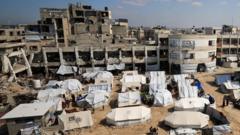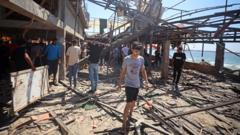The Arab League has formalized a $53bn reconstruction initiative aimed at Gaza, countering President Trump's proposal for the region. This multifaceted plan emphasizes Palestinian rights and governance while addressing the urgent need for physical reconstruction in war-torn Gaza.
Arab Nations Unveil $53bn Plan to Reconstruct Gaza, Reject Trump's Proposal

Arab Nations Unveil $53bn Plan to Reconstruct Gaza, Reject Trump's Proposal
Leaders from Arab countries convene in Cairo to approve a comprehensive $53bn reconstruction plan for Gaza, opposing President Trump's controversial vision.
Arab leaders have unveiled a substantial $53 billion reconstruction strategy for Gaza, a decisive move aimed at countering President Donald Trump’s controversial proposal for the region, which had included the relocation of over two million Palestinians. The plan was formally approved during an emergency summit held in Cairo, with Arab League Secretary-General Ahmed Aboul Gheit declaring that "the Egypt plan is now an Arab plan."
While not directly naming Trump’s initiative, the Arab leaders collectively rejected any form of displacement of the Palestinian population. Egypt, which spearheaded the plan, presented a comprehensive 91-page document featuring detailed imagery of revitalized neighborhoods and modern public infrastructure. The Arab world reacted strongly against Trump's vision dubbed the "Middle East Riviera," which many found unsettling.
In remarks that emphasized a political dimension alongside development, Egyptian President Abdul Fattah al-Sisi highlighted the necessity of pursuing a two-state solution. Many view this as the only viable resolution to the ongoing conflict, despite opposition from Israeli Prime Minister Benjamin Netanyahu, who has dismissed the idea.
The proposed plan also calls for Gaza to be governed temporarily by a "Gaza management committee" formed by qualified professionals under the Palestinian government. However, the role of Hamas remains unclear, as some Arab countries advocate for the group's dismantlement while others believe such decisions are for Palestinians to make themselves. Hamas has signaled its reluctance to disarm, calling it a "red line."
As for security, the plan suggests that the UN Security Council deploy international peacekeepers to ensure stability. A significant international conference is planned for next month to raise funding for the proposed extensive rebuilding efforts—a sum that wealthy Gulf nations are expected to shoulder if they are assured against future conflicts.
This reconstruction agenda is structured across three stages, starting with a six-month "early recovery stage" focused on debris clearance and ordnance disposal. Displaced persons, estimated at around 1.5 million, are to be provided with temporary, well-designed housing in landscaped areas during the reconstruction phases.
In stark contrast, President Trump's characterization of Gaza as merely a "demolition site" has ignited further outrage. The UN estimates that over 90% of homes in Gaza are either destroyed or badly damaged, compounding the urgency of rehabilitation efforts.
In a controversial display, Trump promoted an AI-generated video depicting an idyllic version of Gaza that showcased a lavish lifestyle featuring figures like himself and allies within the context of the region's recovery—an approach that has drawn ire and disbelief from many observers.
As this ambitious Egyptian proposal gains traction, it emphasizes collaboration across various sectors and draws lessons from previous cities that have recovered from devastation. It remains to be seen whether the Arab nations can demonstrate that their plan offers a viable alternative to the American perspective on Gaza’s future.






















